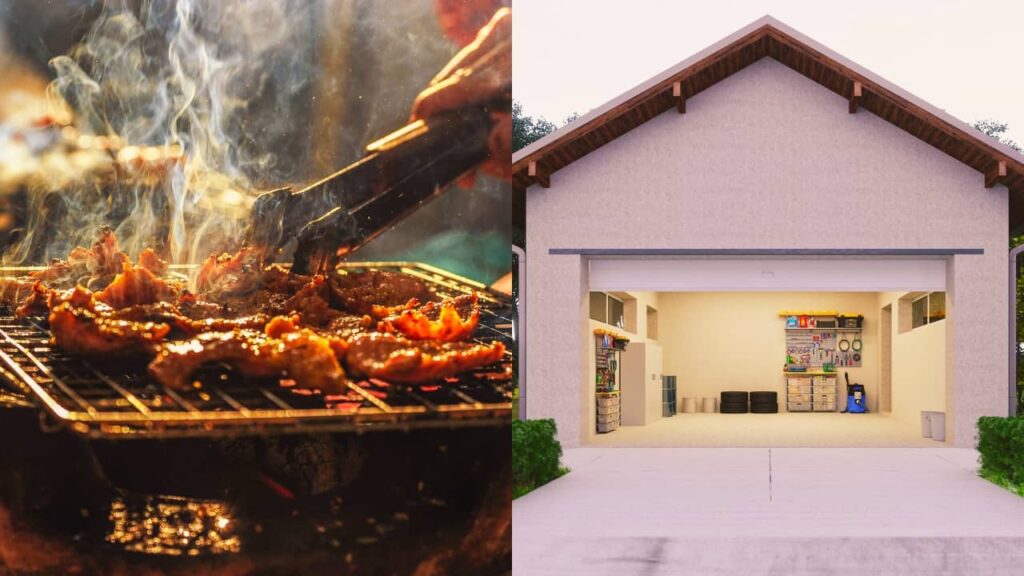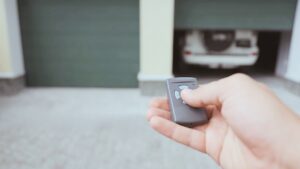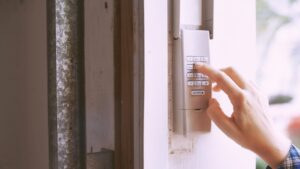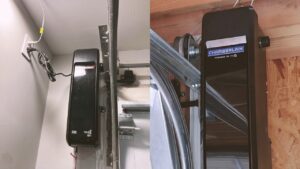Is grilling in garage a good idea? The simple answer is no!
Grilling in the garage is convenient because it keeps you out of the rain or cold. But it also comes with many dangers.
Even with the door open, grilling in a garage is dangerous for your health and the safety of others in your home.
First, fire is the biggest issue. Carbon monoxide, formaldehyde, and other dangerous chemicals can build up in the garage and cause serious health problems.
Now, if you still have questions, read more as we discuss other options, tips, and guides for grilling in your garage.
What Happens When You Grill Inside the Garage?
Grilling in the garage can be dangerous for a number of reasons.
By lighting the fire, you expose an open flame to the combustible gases that are present in the garage’s confined space. In the worst case, this might create a fire hazard that puts people at risk.
Smoke can travel from the garage to different parts of the house, spreading harmful contaminants such as carbon monoxide and formaldehyde, which are colorless and odorless gasses. Smoke may quickly spread through vents and door bottom openings, posing a threat to the occupants.
Carbon monoxide poisoning and other respiratory issues may develop as carbon and formaldehyde gas levels rise.
There are a number of risks to your health and your family’s safety when you grill inside your garage. Here are some of them:
1. Flammable Fuel

One of the greatest risks of grilling in the garage is the ignition of combustible gasoline. There is a significant risk of fire when flammable materials are used near an open flame. Any flammable materials, such as gas canisters or wood furniture, should be properly stored away to limit the possibility of a fire.
2. Fire Hazards
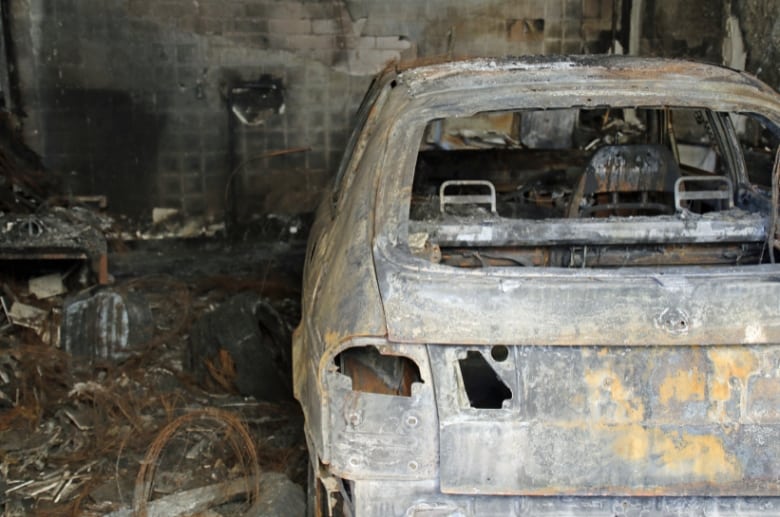
When grilling in the garage, fire is another threat to be aware of. If you start a fire in the garage, it would be tough to extinguish it because of the limited space and proximity to flammable materials. Furthermore, the grill’s heat and smoke may quickly accumulate in the garage, making it an unsafe environment for everyone within.
3. Carbon Monoxide Poisoning

One of the dangers of grilling in the garage is the inhalation of toxic fumes and the risk of developing respiratory illness. It’s dangerous to grill with the garage door closed because the carbon monoxide fumes can build up and cause poisoning. Gas grills are more harmful than charcoal ones because they release higher levels of carbon monoxide.
Connect With A Garage Expert
Connect with local experts, Compare quotes, Get the best price.
4. Soot Build-up
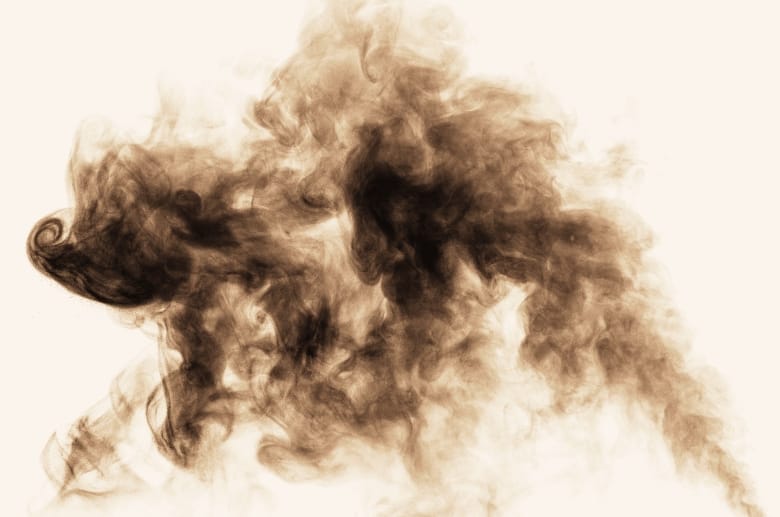
The black, powdery material called soot is the byproduct of burning fossil fuels like coal, oil, and natural gas. Breathing in these tiny particles is dangerous since they can irritate the lungs and cause health problems, including asthma and other respiratory disorders. Because they’re sticky, it’s difficult to clean off soot from surfaces. Soot accumulation can also discolor or damage valuable materials or furniture.
5. Flammable Materials
Evaluating any combustible products or flammable materials stored in the garage is critical. When grilling in the garage, the risk of starting a fire increases if flammable materials like gasoline, cleaning chemicals, or paint are stored there. For example, sparks from metal friction can easily start a fire when they come in contact with combustible chemicals.
Can I Grill in the Garage with the Door Open?
Grilling in the garage with the door open may help to vent out some of the harmful contaminants produced by the grill, but…
It’s NOT ENOUGH!
If you want to grill in your garage, you need a powerful range hood designed to help remove smoke, steam, and other contaminants. Grill hoods are installed above a stove or grill and are equipped with a fan that facilitates better ventilation.
In addition, it’s never a good idea to store or use propane tanks inside the garage, as they are highly combustible and can pose a serious fire hazard.
Types of Grills to Avoid Using Inside the Garage
There are grills that are too unsafe to use in the garage, and you’re probably still using them. It’s best to exercise caution and keep these grills out of the garage for everyone’s safety.
1. Natural Gas Grills
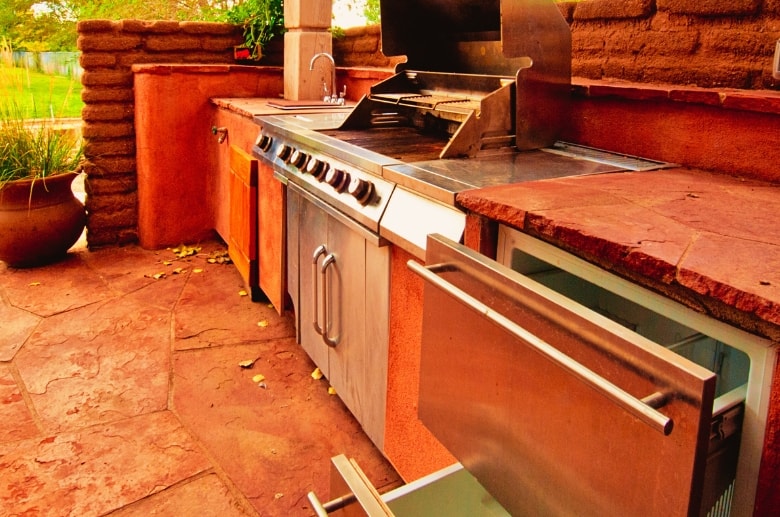
When natural gas burns, it produces carbon monoxide, a colorless and odorless gas that can be harmful if inhaled. Carbon monoxide can accumulate in the confined space of a garage, and if it reaches high enough levels, it can be dangerous for people and pets in the home.
2. Propane Grills
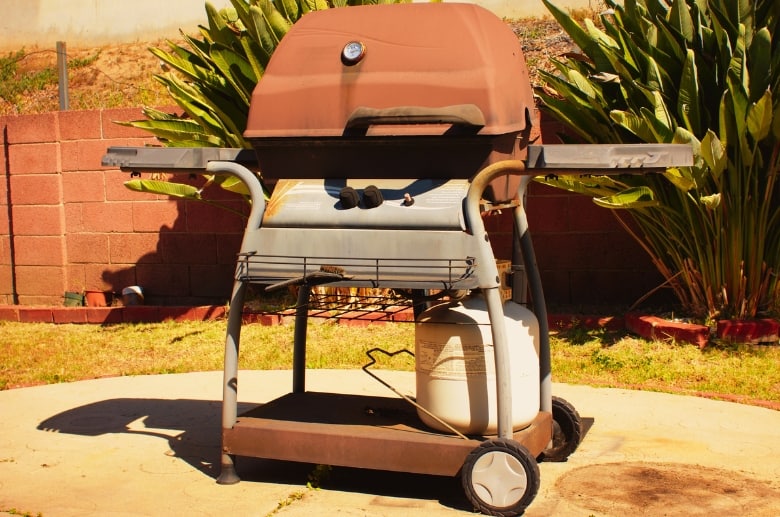
Propane grills operate the same way as natural gas grills, and they also produce carbon monoxide when burned. Aside from carbon monoxide exposure, propane grills also increase the fire risk because of the combination of the fire itself, fuel, and flammable materials in the garage space.
3. Charcoal Grills
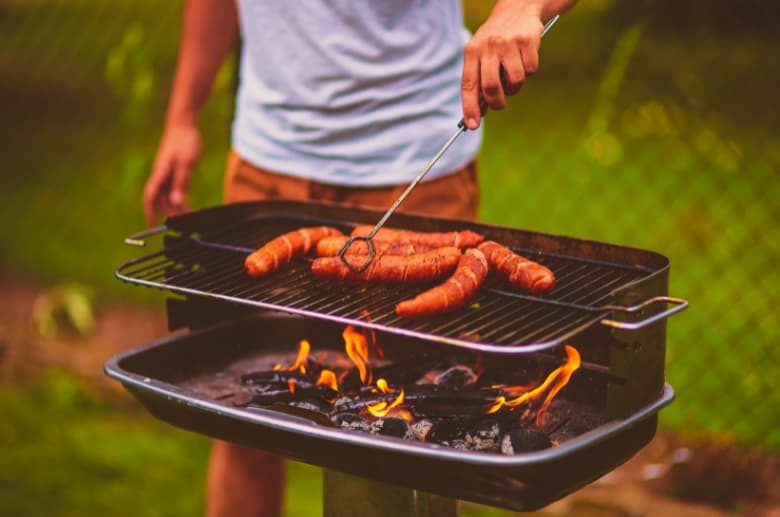
Charcoal is a solid fuel produced by burning wood or other organic materials. Carbon monoxide and particulate matter are two examples of pollutants that charcoal grills may produce. They can also be dangerous because of the possibility of fire when the flying embers land on flammable materials, such as paint, oil, or wood.
Is There a Way to Grill Inside My Garage?
YES! Fortunately, there are some ways to grill inside your garage while avoiding the dangers we talked about earlier.
While it is generally not recommended to grill inside a garage, alternative options can allow you to grill safely in a confined space. These options are suitable for those who do not have access to an outdoor space or who are looking for a convenient way to grill indoors.
Use an Electrical Grill
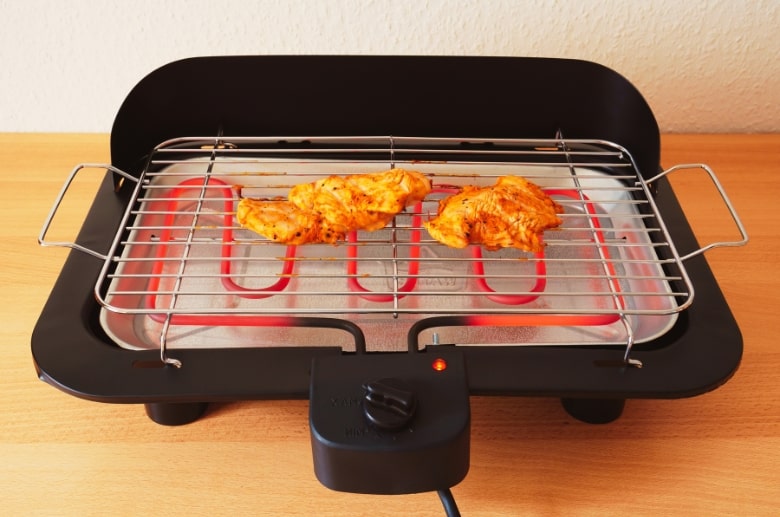
Electrical grills are more expensive than gas, propane, or charcoal grills but are safer for indoor use. They don’t produce any potentially dangerous byproducts like carbon monoxide or soot.
Furthermore, electrical grills often have safety features like automatic shut-off and temperature control to help limit the risks of accidents and injuries.
Install a Powerful Grilling Hood
When grilling in the garage, a grill hood or range hood installed above the stove can greatly improve ventilation and help prevent the spread of potentially hazardous smoke and other airborne particles. Smoke, steam, and other byproducts of grilling are sucked up into the grill hood and expelled safely outside the home.
Would an electrical grill catch fire?
The most common reason for an electric grill to catch fire is a short circuit, which happens when the flow of electricity is interrupted and continues in an unexpected way. Overheating can also occur if the smoker’s heating element malfunctions.
Grilling Outdoors While Keeping Yourself Dry
Obviously, grilling outside is still considered the safest option.
Natural ventilation can help lower the danger of breathing toxic particles or starting a fire.
Grilling canopies, retractable awnings, and umbrellas are a few options that provide shade and protection from the elements, making it more comfortable to grill outdoors.
Garage Grilling Safety 101
With the proper precautions, it is possible for anyone to grill safely inside their home or garage.
By following proper safety guidelines and using the appropriate equipment, it is possible to reduce the risk of accidents or injuries and grill delicious food inside the garage.
Here are some tips and precautions you need to follow when grilling inside a garage:
Before Grilling:
- Check if the grill is well-assembled and in good operating condition.
- Examine the grill for signs of damage and replace any worn or broken parts.
- Remove all flammable materials near the grill.
- Place the grill on a leveled, sturdy surface and keep it at least three feet away from the nearest wall or other objects.
- Keep an extinguisher close by in case of fire.
During Grilling:
- When using the grill, always follow the manufacturer’s instructions carefully.
- Cover the grill if you’re not using it.
- Never leave the grill while cooking.
- To prevent burns, keep kids and animals away from the grill.
- Use long-handled utensils to avoid burns.
After Grilling:
- Wait for the grill to cool completely before moving or storing it away.
- Turn off the gas supply and disconnect the propane tank.
- Thoroughly clean the grill; remove any grease or food residue.
Final Words
So, is grilling in the garage a good idea? Definitely not!
Obviously, it’s safer to grill outdoors rather than in a confined space like the garage. But, if it isn’t possible to grill outdoors because of bad weather, you should ditch the natural gas, propane, or charcoal grills. When grilling indoors, an electric grill is still the safest option.
However, keep in mind that even electric grills may pose some hazards, so it’s essential to follow adequate safety measures and use caution when grilling inside.
Safety devices like fire extinguishers, sprinklers, and carbon monoxide detectors should also be installed in your garage to lessen the likelihood of accidents and injuries further. By following safety measures, you can enjoy the smoky flavor of grilled meals in the safety of your own garage without risking injury to yourself or others.
FAQs
Is grilling in the garage illegal?
Grilling inside a garage is not against the law in the United States. Indoor grilling is legal in most states, but there are exceptions for the use of some potentially hazardous grilling devices. Before starting a grilling session in a residential neighborhood, it’s wise to find out whether there are any restrictions or regulations from the local authorities or the homeowners’ association.
Can I store my grill in the garage?
You can keep your grill in the garage as long as you follow safety precautions. Turn off the gas and remove the propane tank from your grill before putting it away in the garage. This will lessen the likelihood of leaks or flames starting by accident.
Should you grill in your garage when it’s raining?
Using an electric grill or similar equipment is the safest option when grilling in a garage, especially when it’s raining. For this, you may use a grill pan, a grill press, an indoor smoker, pellets, or a stovetop grill.

